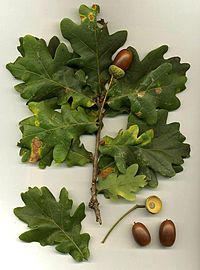
Photo from wikipedia
AIM: Although the effects of climate on species richness are known, regional processes may lead to different species richness–climate relationships across continents resulting in species richness anomalies, especially for tropical… Click to show full abstract
AIM: Although the effects of climate on species richness are known, regional processes may lead to different species richness–climate relationships across continents resulting in species richness anomalies, especially for tropical groups. Phylogenetic niche conservatism may also influence species richness–climate relationships of different lineages. Here, we tested whether regional effects also exist for temperate lineages using the genus Quercus. LOCATION: Northern Hemisphere. TIME PERIOD: Present day. MAJOR TAXA STUDIED: Quercus (Fagaceae). METHODS: We used a dated phylogeny and distribution data for Quercus to evaluate its global species richness patterns and phylogenetic niche conservatism. To evaluate the consistency in species richness–climate relationships across continents of the genus Quercus as a whole and the temperate subgenus Quercus, we conducted analyses of covariance with continent as the categorical variable and climate variables as the covariate. We calibrated four widely used models using the global data or data from each continent separately and evaluated the predictive power of each model for different continents using the root mean squared error. RESULTS: The relationships between species richness and climate were not significantly different among continents for both the genus Quercus as a whole and the subgenus Quercus. Unlike the models based on European data, those based on North American and eastern Asian data predicted both the global species richness and the richness in other continents. The species richness of a subtropical subgenus Cyclobalanopsis was most influenced by water availability, while that of a temperate subgenus Quercus was most influenced by environmental temperature. MAIN CONCLUSIONS: In contrast to the subtropical subgenus Cyclobalanopsis, our results showed a consistent richness–climate relationship and absence of regional effects on species richness across continents for the temperate subgenus Quercus, likely suggesting that the species richness of temperate lineages, for example subgenus Quercus, may have reached equilibrium with the contemporary climate in the Northern Hemisphere.
Journal Title: Global Ecology and Biogeography
Year Published: 2019
Link to full text (if available)
Share on Social Media: Sign Up to like & get
recommendations!